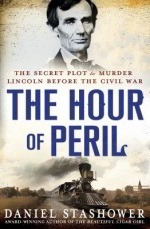
Library Director’s Notebook
April, 2013
Today we take for granted that the person elected to serve as the President of the United States will be surrounded at all times by highly trained, ever-vigilant professionals , willing to put their bodies on the line to protect the nation’s chief executive. Yet when Abraham Lincoln, newly elected president, made his way by railway across the country in February, 1861, a trip that was supposed to be triumphant, but which from its very beginning was fraught with danger and murderous intentions, he had no cadre of protective professionals assuring his safety every step of the way.
What Lincoln did have was a small group of trusted friends and advisors, several of whom had military training, but most of whom were just good friends, concerned about his safety and well-being, but not fully convinced that Lincoln’s life was in serious danger. One man was an exception, however, although his knowledge of the plot to kill Lincoln came to his attention while he was investigating another matter. That man was Allan Pinkerton.
Yes, that Pinkerton: the one whose name is synonymous with his famous detective agency, one of the earliest agencies in the United States doing undercover detective work in a professional way. Pinkerton’s careful work, his challenges, his mistakes, and his successes are carefully and intriguingly noted in the book The Hour of Peril by Daniel Stashower. Pinkerton was not alone in uncovering the plot to assassinate Lincoln as he made a stop in the tumultuous pro-slavery city of Baltimore, Maryland. Instead, Pinkerton relied on the level-headed, quick-witted actions of his operatives, including a female operative named Kate Warne, who used her impressive skills to infiltrate many gatherings, where she appeared in the role of a Southern rights sympathizer, to glean vital information about plans for the presidential assassination.
Yet even after weeks of painstaking detection work, work that often put the undercover operatives at great peril, the biggest task lay ahead—convincing Lincoln to change his itinerary and not make a train stop in Baltimore. Although the facts and the detective work proved without doubt that a large group of bitter secessionists (some reports alleged there were thousands in the plot) planned a deadly attack on Lincoln during his public appearance in Baltimore, Lincoln himself was extremely loathe to change his plans.
His reluctance is understandable. His itinerary of public appearances had been published in all the newspapers for weeks. He had used his frequent railway stops to greet his hoards of supporters and to offer conciliatory words to his detractors. To pass ahead of time through Baltimore, to use subterfuge to escape on a different train with no one knowing of his flight, could not help but look cowardly, according to Lincoln.
He was right. Although finally persuaded to change his plans and slip secretly by night through Baltimore into Washington, DC, Lincoln’s actions were harshly condemned as cowardice, not only by opposing Democrats and Southerners, but by pretty much all of his fellow Republicans, including some of his most stalwart supporters. The papers had a field day chiding and de-riding the President-elect. It would take the start of the bloody Civil war to finally draw attention away from Lincoln’s flight from Baltimore.
What if Pinkerton had not been able to persuade Lincoln to change his plans? Most historians, studying the documentation of the time, including Daniel Stashower, believe that assassination and the bitter national pandemonium that would have followed would have been inevitable. It is impossible for us at the distance of more than 150 years to imagine the Civil War period without the visionary leadership of Abraham Lincoln. Assassination would come inevitably, as Lincoln himself was all too well aware; but the efforts of Pinkerton, his operatives and other military and elected leaders and close friends helped to prevent the assassination of President Lincoln, for at least a few years.
To his dying day, Allan Pinkerton regretted that he had not been at Lincoln’s side at Ford‘s Theater that fateful evening of April 14, 1865. Yet the triumph of Pinkerton’s life was in 1861 when through his untiring efforts he was able to save President Lincoln. The Hour of Peril is a gripping, eye-opening exploration of the dangers of the presidency, which surely apply as much today as they did 150 years ago.




